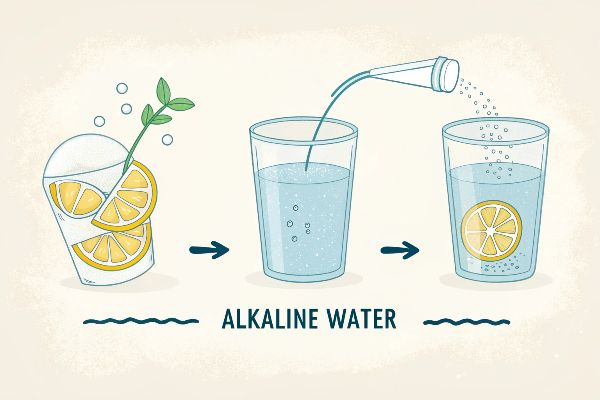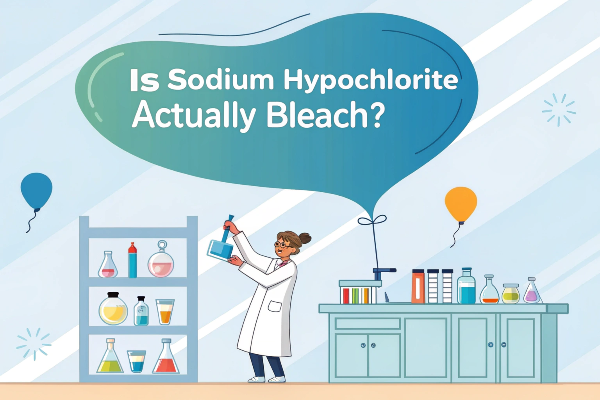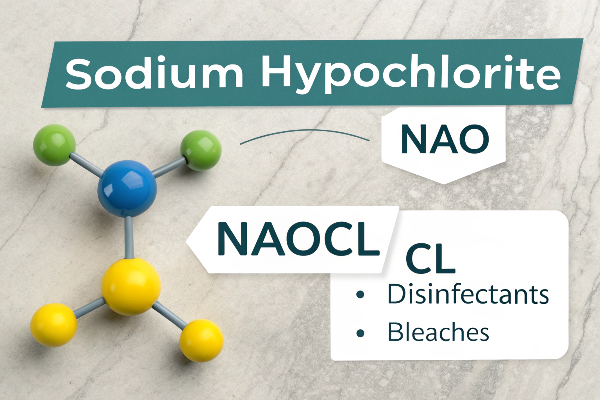Is the thought of rust creeping onto your prized possessions keeping you up at night? It’s a valid concern, especially when dealing with metals.
Titanium, in its pure form, does not rust. Rust is iron oxide, formed by the reaction of iron and oxygen in the presence of water or air moisture. Titanium doesn’t contain iron, so it can’t form iron oxide.
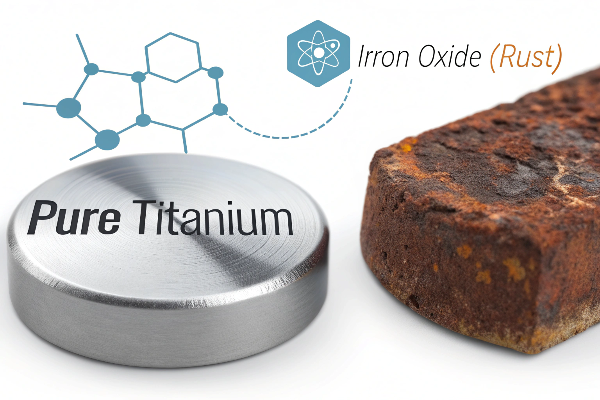
But the full story of titanium and corrosion is much more interesting. Let’s dive into the specifics to find out more.
Does Titanium Rust in the Shower?
Are you worried about your titanium jewelry or fixtures tarnishing in the humid environment of your shower? It’s a common concern.
Titanium will not rust in the shower. The water and humidity, which accelerate rusting in many metals, do not have the same effect on titanium. It is highly resistant to corrosion in most natural water environments.
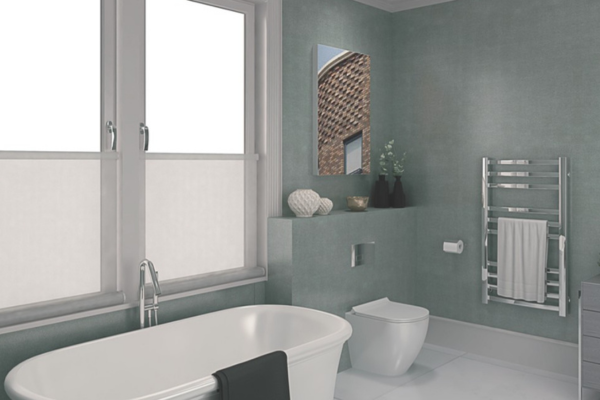
Why Titanium Survives the Shower
Titanium’s resistance comes from its ability to form a passive, protective oxide layer when exposed to oxygen. Let’s explore the science behind this:
| Feature | Description |
|---|---|
| Passive Layer1 | When titanium is exposed to oxygen, it instantly forms a thin, strong, and non-reactive layer of titanium dioxide (TiO2). This layer is extremely thin, only a few nanometers thick. |
| Self-Healing2 | If this passive layer is scratched or damaged, it instantly reforms, as long as there is oxygen present. This "self-healing" property is what gives titanium its remarkable resistance to corrosion. |
| Inertness | Titanium dioxide is chemically inert in most environments, including those containing water, chlorine (common in tap water), and even saltwater. This means it doesn’t react with the chemicals that typically cause corrosion in other metals. |
This makes titanium a favorite for bathroom fixtures and body jewelry, where exposure to moisture and cleaning products is frequent. I learned this the hard way with older metal items.
How Long Does It Take for Titanium to Corrode?
Wondering about the lifespan of titanium in harsh conditions? It’s a reasonable question, especially if you’re investing in titanium products3.
Under normal atmospheric conditions, titanium can essentially last indefinitely without corroding. In more aggressive environments, like exposure to certain acids or high temperatures, corrosion can occur, but it is still extremely slow compared to most metals.

Factors Influencing Titanium’s Corrosion Rate
The rate of corrosion, even for a resistant material like titanium, depends on a variety of factors:
| Factor | Description |
|---|---|
| Environment | Exposure to aggressive chemicals (e.g., hydrochloric acid, sulfuric acid), high temperatures, and high pressures can accelerate corrosion, even in titanium. |
| Alloying | Pure titanium is more corrosion-resistant4 than most titanium alloys. Alloying elements, while often improving strength or other properties, can sometimes reduce corrosion resistance. |
| Surface Condition | A smooth, clean titanium surface with a well-formed passive layer is more resistant to corrosion than a rough or contaminated surface. |
Even in aggressive conditions, the corrosion of titanium5 is usually measured in millimeters per year (or even fractions of a millimeter), which indicates an exceptionally slow rate. I still have the titanium…
Is Titanium Rust Resistant?
This may seem like an obvious question after the previous points, but it’s important to address it directly.
Yes, titanium is exceptionally rust-resistant6. As mentioned, rust is iron oxide, and titanium does not contain iron. Therefore, it cannot rust in the way that iron or steel does.
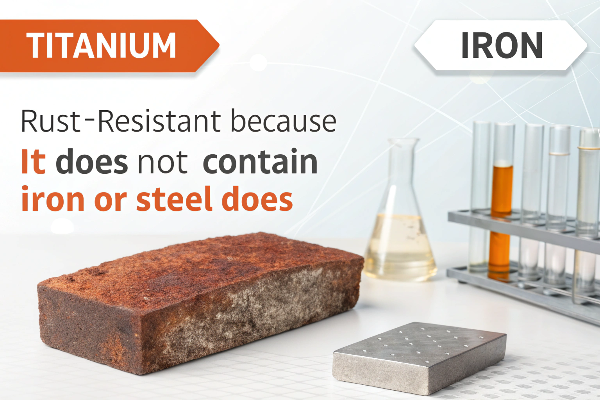
Rust Resistance vs. Corrosion Resistance
It is crucial to understand this distinction:
- Rust Resistance: Specifically refers to the inability to form iron oxide.
- Corrosion Resistance: A broader term that encompasses resistance to various forms of chemical degradation, not just rust.
Titanium is both rust-resistant6 (because it’s not iron) and highly corrosion-resistant (due to its protective oxide layer7). This is why it’s a top pick for many applications.
Will Titanium Rust with Water?
We’ve touched on this, but let’s clarify the specific interaction between titanium and water.
No, titanium will not rust when exposed to water. Water, in its pure form, is not corrosive to titanium. In fact, titanium’s protective oxide layer can form and be maintained in the presence of water.
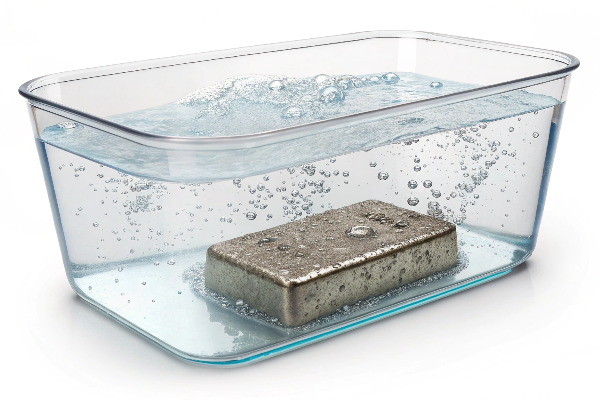
The Role of Water in Corrosion (of Other Metals)
It is essential to understand why water does cause rust in other metals:
| Aspect | Explanation |
|---|---|
| Electrolyte | Water acts as an electrolyte, allowing the flow of electrons between different areas of a metal surface. This is crucial for the electrochemical reactions that lead to rust (in iron-containing metals). |
| Oxygen Dissolution | Water can dissolve oxygen from the air, providing the oxygen needed for the oxidation reaction that forms rust. |
| Impurities | Water often contains dissolved salts, acids, or other substances that can accelerate corrosion. |
However, these factors do not lead to rust in titanium because titanium does not contain iron and forms that protective oxide layer.
What Happens to Titanium When It Gets Wet?
We’ve established that titanium doesn’t rust, but what does happen when it gets wet?
When titanium gets wet, very little happens. The water may temporarily bead up on the surface, but it will not cause any chemical reaction or degradation of the metal.
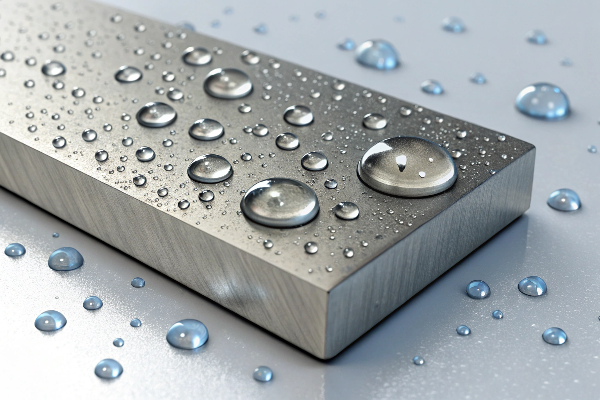
Understanding the Inaction
Here’s why titanium remains largely unaffected by water:
- Hydrophobic Properties8: Titanium, especially when polished, can exhibit some hydrophobic properties, meaning it tends to repel water.
- Passive Layer Stability9: The titanium dioxide layer is stable in the presence of water. Water molecules do not penetrate or disrupt this protective barrier.
- No Electrochemical Reaction10: Unlike iron, titanium does not readily undergo the electrochemical reactions with water and oxygen that lead to corrosion.
Is Titanium Better Than Stainless Steel?
This is a common comparison, as both metals are known for their corrosion resistance.
Titanium is generally superior to stainless steel in terms of corrosion resistance, especially in harsh environments. However, stainless steel is often stronger and less expensive, making it a better choice for some applications.
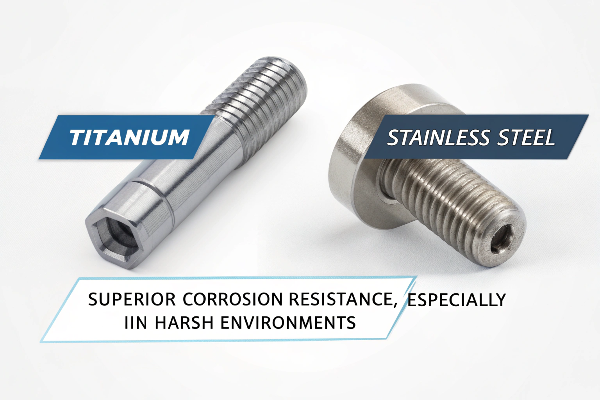
Comparing the Two Metals
Here’s a breakdown of their key differences:
| Property | Titanium | Stainless Steel |
|---|---|---|
| Corrosion Resistance | Superior, especially in chloride-containing environments (saltwater, bleach). | Good, but susceptible to pitting and crevice corrosion in chloride environments. Different grades of stainless steel offer varying levels of corrosion resistance. |
| Strength-to-Weight Ratio | Excellent. Much lighter than stainless steel while maintaining comparable strength. | Good, but significantly heavier than titanium. |
| Cost | Generally more expensive than stainless steel. | More affordable than titanium. |
| Applications | Aerospace, medical implants, marine applications, high-performance equipment where weight and corrosion resistance are critical. | Wide range of applications, including construction, kitchenware, appliances, automotive parts, and industrial equipment. Different grades are chosen based on the specific requirements of the application. |
| Rusting | Does not rust. | Contains iron, and thus can rust under certain conditions, although it is far more rust-resistant than regular steel. "Stainless" refers to its resistance to staining, not complete immunity to rust. |
Choosing between titanium and stainless steel depends on the priorities.
Conclusion
Titanium’s exceptional resistance to rust and corrosion, stemming from its ability to form a self-healing protective oxide layer, makes it a remarkable metal for many applications. While it may be more expensive than some alternatives, its longevity and performance in harsh environments often justify the investment.
-
Understanding the passive layer of titanium can help you appreciate its durability and longevity in various environments. ↩
-
Discover the fascinating self-healing mechanism of titanium that enhances its resistance to wear and tear, making it a superior choice for jewelry. ↩
-
Exploring the benefits of titanium products can guide you in choosing durable and long-lasting materials for your needs. ↩
-
Comparing titanium with other metals can provide insights into its unique properties and advantages in harsh conditions. ↩
-
Understanding the corrosion rate of titanium helps in making informed decisions for its use in various applications. ↩
-
Explore this link to understand the unique properties of titanium that contribute to its rust resistance, enhancing its applications. ↩ ↩
-
Learn about the protective oxide layer on titanium and its significance in preventing corrosion and enhancing durability. ↩
-
Understanding titanium’s hydrophobic properties can enhance its applications in various industries, making it a valuable resource for material science. ↩
-
Exploring the passive layer stability of titanium reveals its unique corrosion resistance, crucial for applications in harsh environments. ↩
-
Learning about titanium’s lack of electrochemical reactions can provide insights into its durability and longevity in various applications. ↩



